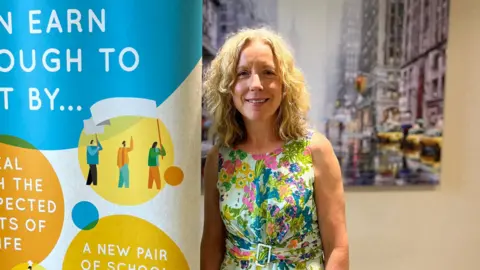Real Living Wage: Northern Ireland lagging behind rest of UK

 BBC
BBCNorthern Ireland is lagging behind other parts of the UK when it comes to employers who pay the Real Living Wage, despite having one of the highest proportions of low paid workers in the UK.
The Real Living Wage is set on what it costs “to get by” as calculated by the Resolution Foundation – it is currently set at £12 an hour outside London.
It is a voluntary scheme that businesses can pay to sign up to in order to be accredited.
More than 15,000 businesses across the UK have signed up – less than 100 of those are based in Northern Ireland.
What are the different wage rates?
The national minimum wage is legally enforceable and depends on your age.
It is £6.40 an hour for workers under 18 and apprentices and £8.60 an hour for people aged 18-20.
The national living wage is also statutory and is set at £11.44 an hour for workers aged 21 and over.

Regional Manager for Living Wage NI, Mary McManus, said growing the number of employers paying the living wage had been a slow process in Northern Ireland
“In Scotland they are very much ahead with almost 4,000 employers signed up and Wales has almost 600 employers signed up,” she said.
She said Northern Ireland was lagging behind, because while the population of Scotland was three times higher than Northern Ireland, it had 40 times the amount of real living wage employers.
“It’s taken us about 13 years to get to this point and this is also reflected in the fact that we have one of the highest rates of people in Northern Ireland being paid below the real living wage in the UK,” she said.
How many people earn the real living wage?
Official wage figures for last year show 15.6% of employee jobs last year were below the real living wage, which is one of the highest proportions in the UK, well above the UK average (12.9%), Wales (12.9%) and Scotland (10.1%).
That means an estimated 190,000 people in Northern Ireland earning below the threshold.
The parliamentary constituencies with the biggest proportion of workers earning less than the real living wage are:
- Belfast West
- Foyle
- Fermanagh and South Tyrone
- East Londonderry – where one in five earn below the threshold
Women were more likely to be paid below the real living wage, as were part-time workers.

St Columb’s Trust in Londonderry is a charity that has not previously been able to afford to pay workers the living wage.
Project manager Anne Marie Gallagher is working to change that from September for their eight workers.
It has consolidated its services and changed its opening hours in order to make it work.
“Charities and some small businesses can find that difficult to try to achieve,” Ms Gallagher said.
“Mainly because funding, especially for charities, doesn’t really reflect the cost of doing that for staff.
“It has definitely involved us cutting our cloth to what is the most profitable way for us to operate St Columb’s Hall but also taking into account the needs of the community too.
“We want to be making a positive contribution to our community that we should be paying our workers enough so that they don’t have to visit food banks.”
But she acknowledged that it was not possible for everyone.
“I know that a lot of charities and the community and voluntary sector in the city are struggling just to do what they are doing right now,” she said.
“They’re not getting those increases in funding to reflect those higher costs.
“We know bills like energy are higher and their funding hasn’t increased so they can’t afford to do it.”
‘I’ve fought for a living wage’
Madison Kryt is supervisor of Bullhouse East bar in east Belfast and has been receiving a real living wage for more than six months.
She has worked in hospitality for years but this is the first job which has paid her the Real Living Wage.
“It makes a big difference,” she said.
“In a lot of my previous jobs I’ve fought for a living wage going for new positions so being on a living wage now is huge, it means I am able to afford to live here and have a life outside of work as well.”
In previous workplaces, employers told her they could not afford to pay the real living wage.
“After those meetings I have just ended up finding a different job that either paid more or seemed to value their employees more,” she said.

Bullhouse managing director William Mayne said it made business sense.
“It has been useful for us when it comes to recruiting new staff and retaining staff,” he said.
He added that he hoped more young people would consider hospitality as a viable long term career, rather than a stepping stone.
“The hospitality industry is classed as a low-pay industry, but we don’t think it has to be,” he said.
Mr Mayne said it had not affected pricing, but prices have had to rise because of inflation.
Related
Why investing in women is a vital next step for…
Get Nadine White's Race Report newsletter for a fresh perspective on the week's newsGet our free newsletter from The Independent's Race CorrespondentGet our fre
Business secretary signals major shift on electric car policy to…
In a determined effort to retain Nissan’s manufacturing presence in Britain, Business Secretary Jonathan Reynolds has vowed to implement “substantial c
Joint Statement: Business Secretary and Fujitsu Services Ltd
Business and Trade Secretary Jonathan Reynolds today (Friday 7 March) met chiefs for Fujitsu in Tokyo to begin talks over the cost of redress for victims of th
UK foreign secretary backs multilateral defence funding for Europe
UK foreign secretary David Lammy has said that a new multilateral fund will be needed to secure Europe’s defence as he confirmed that Britain is “open to”














